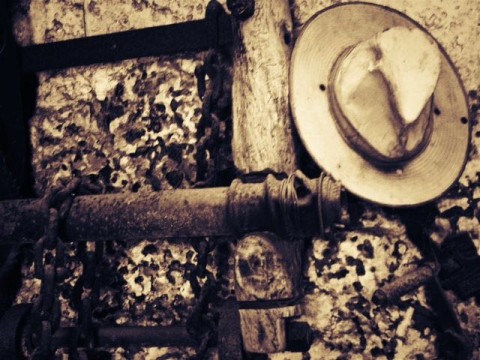At first I figured Harold was practicing a new trick—like he sometimes did to my father’s underwear, maybe he was making my ear disappear. But then it felt as though my head was splitting apart. He tugged me by my ear out of my chair, so that I hovered over his blank, pale face. If I let him be he was a familiar man. A man my father called brother. The bigger brother my father may have once needed. A face I saw each time I grabbed milk from the fridge, he and family in overalls and cowboy hats, leaning against hay bales at the apple orchard, pieced together smiles for my mother’s camera. What kept me from running off to sort baseball cards at Grossman-Berger get-togethers—the fear of missing his trick. “Do me now, do me,” I would whine, my father’s underwear still around Harold’s fist. “Not until you’re sixteen,” one hundred times, the same reply. He might as well have said, “Not until you’re thirty-two.” But as he tightened his grip and pulled harder, I decided not to look into a face that once comforted me. I let his eyes, mouth, nose vanish, so that he could have been any outline of any strange man. A thread of brisket wedged between two of his small teeth reminded me that I still had food on my plate. I shut my eyes and pretended no one else was in the room. The table had been set for his wife and children too, but it was only Harold and apologies on his family’s behalf. I wondered if he was making all of me disappear, if he had made Nancy and Dana disappear. A speck of light crept under my eyelids, the light at end of the tunnel that I had heard of on TV, and it became clear this was more than a trick, the final moments of Norman Berger? I sometimes imagined being flattened by a bus or pushed from a rooftop to finalize my little life, cutting off potential for further tragedy, for further worry over this one young person. Though Harold made it through an entire war, and only had one bad ear, the good one too good for his own good, the one I must have shouted into. I tried hard but couldn’t imagine anyone or anything able to harm Harold, so I imagined him even angrier, my head a basketball as he dribbled it off our dining room table. A flash of light and then I remembered the Shabbat candles, and my mother who lit them coughed. When I opened my eyes—my ear numb, perhaps no longer attached to my head—my parents were right where I left them, just across the table, each looking to the other, eyes fluttering, mouths stuffed with brisket.
Discipline

art by Claire Ibarra


 The core workshop of SmokeLong Fitness is all in writing, so you can take part from anywhere at anytime. We are excited about creating a supportive, consistent and structured environment for flash writers to work on their craft in a community. We are thrilled and proud to say that our workshop participants have won, placed, or been listed in every major flash competition. Community works.
The core workshop of SmokeLong Fitness is all in writing, so you can take part from anywhere at anytime. We are excited about creating a supportive, consistent and structured environment for flash writers to work on their craft in a community. We are thrilled and proud to say that our workshop participants have won, placed, or been listed in every major flash competition. Community works.